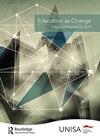Slow Scholarship: Propositions for the Extended Curriculum Programme
IF 1
4区 教育学
Q3 EDUCATION & EDUCATIONAL RESEARCH
引用次数: 1
Abstract
Higher education has been deeply affected by neoliberalism and corporatisation, with their emphasis on efficiency, competitiveness and valorisation of quantity over quality. This article argues that in the context of South African higher education, and in the Extended Curriculum Programme (ECP) more particularly, such commodification of education is problematic. The article explores what the Slow movement has to offer ECP in terms of scholarship. It seeks to answer the question: How might ECP be reconfigured using Slow imaginaries? Various academic disciplines and practices have incorporated Slow philosophy to develop alternative ways of doing academia; however, it has hitherto not been considered for programmes such as ECP. This article approaches Slow pedagogy for ECP using posthuman and feminist new materialist sensibilities that are predicated on a relational ontology. The article puts forward the following 10 propositions for a Slow scholarship in ECP using ideas from posthumanism and feminist new materialism: practice attentiveness through noticing, engage in responsible relations, diffract rather than reflect (thinking together affirmatively), render each other capable, enable collective responsiveness, explore creatively, making thoughts and feelings possible, enact curiosity, ask the right questions politely, foreground process rather than product, and create conditions for trust by wit(h)nessing. It is argued that by practising Slow scholarship with these propositions, ECPs might resist market-driven imperatives that characterise contemporary academia.慢奖学金:扩展课程计划的主张
高等教育深受新自由主义和公司化的影响,它们强调效率、竞争力和数量高于质量的价值。本文认为,在南非高等教育的背景下,尤其是在扩展课程计划(ECP)中,这种教育商品化是有问题的。这篇文章探讨了慢速运动在学术方面为ECP提供了什么。它试图回答这样一个问题:如何使用慢想象来重新配置ECP?各种学术学科和实践都融入了慢哲学,以发展学术的替代方式;然而,迄今为止,它还没有被考虑用于诸如ECP之类的方案。本文使用基于关系本体论的后人类主义和女权主义新唯物主义情感来探讨ECP的慢速教育学。本文运用后人道主义和女权主义新唯物主义的思想,为ECP的慢速学术提出了以下10个命题:通过注意来练习注意力,参与负责任的关系,衍射而不是反思(肯定地共同思考),使彼此有能力,使集体反应能力,创造性地探索,使思想和感受成为可能,激发好奇心,礼貌地提出正确的问题,展望过程而不是产品,并通过智慧创造信任的条件。有人认为,通过用这些命题实践慢学术,ECP可能会抵制当代学术界特有的市场驱动的必要性。
本文章由计算机程序翻译,如有差异,请以英文原文为准。
求助全文
约1分钟内获得全文
求助全文
来源期刊

Education As Change
EDUCATION & EDUCATIONAL RESEARCH-
CiteScore
1.40
自引率
0.00%
发文量
29
审稿时长
24 weeks
期刊介绍:
Education as Change is an accredited, peer reviewed scholarly online journal that publishes original articles reflecting critically on issues of equality in education and on the ways in which educational practices contribute to transformation in non-formal, formal and informal contexts. Critique, mainly understood in the tradition of critical pedagogies, is a constructive process which contributes towards a better world. Contributions from and about marginalised communities and from different knowledge traditions are encouraged. The articles could draw on any rigorous research methodology, as well as transdisciplinary approaches. Research of a very specialised or technical nature should be framed within relevant discourses. While specialised kinds of research are encouraged, authors are expected to write for a broader audience of educational researchers and practitioners without losing conceptual and theoretical depth and rigour. All sectors of education are covered in the journal. These include primary, secondary and tertiary education, adult education, worker education, educational policy and teacher education.
 求助内容:
求助内容: 应助结果提醒方式:
应助结果提醒方式:


